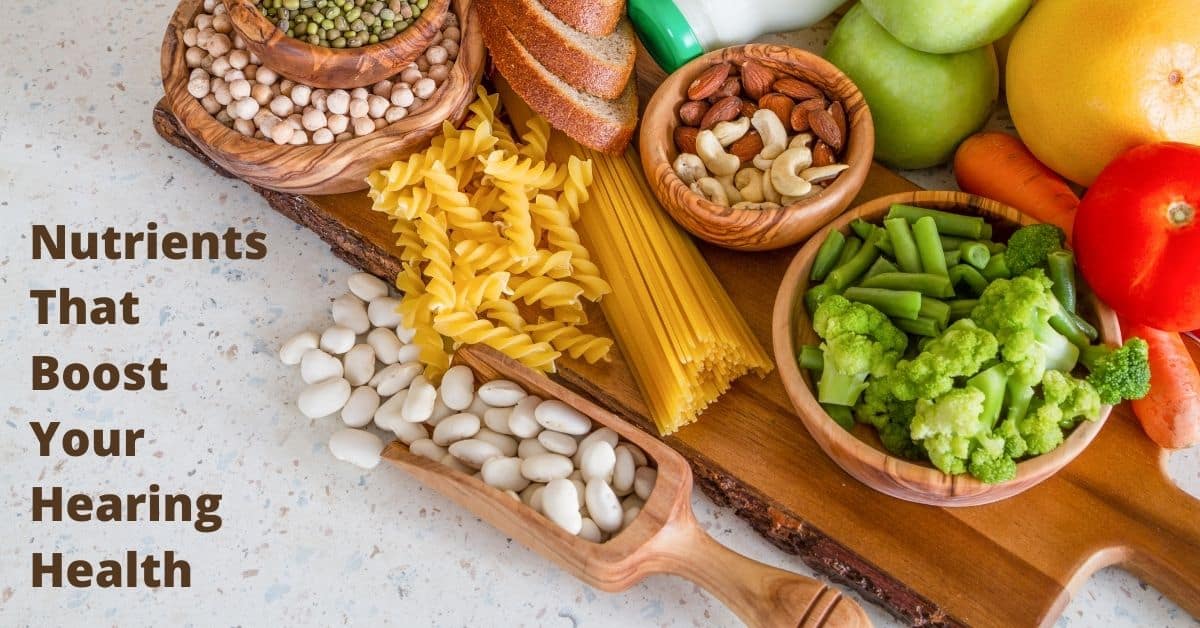Research has shown that defending your body against hearing loss can be….delicious! Eating right can give your system the vitamins and nutrients it needs to support lifelong healthy hearing. A balanced diet plays a critical role in shaping your overall health, and understanding nutrients is a key part of giving your body what it needs.
Considering your diet can be an important part of preventative care for your ears. When combined with hearing protection and avoiding harmful noise levels, the right nutrition can strengthen your hearing, keeping hearing loss at bay.
Vitamin C
Probably the best-known of the vitamins, vitamin C has a reputation for a reason. Also known as ascorbic acid, vitamin C boosts immunity and works as an antioxidant, beating back free radicals that can harm our cell structure. The presence of free radicals has been associated with damage to the fine hair cells of the inner ear that we rely upon for detecting sound waves in the air.
Hair cells are not able to repair themselves if they are damaged, and so an injury to the fragile cell means it is permanently out-of-commission, contributing to hearing loss. Defending our cells against damage, getting enough vitamin C can defend these precious cells from unnecessary harm. Vitamin C is most commonly associated with citrus, but you can also find it concentrated in leafy greens, strawberries, peppers and papaya as well as in vitamin supplements and fortified foods.
Omega-3 Fatty Acids
Omega-3 fatty acids are best known as nutrients that can reduce the risk of heart disease and high blood pressure, but they also have an established link to hearing health. Studies have found that people with a high omega-3 intake have over 40% lower risk for developing hearing loss. This all may be related – better cardiovascular health is also linked to lower incidence of hearing loss, making omega-3 intake and all-around good thing.
Most associated with fish like salmon, you’ll also find omega-3 fatty acids in a variety of whole foods including eggs, lamb, flaxseeds and walnuts. To make sure you have enough omega-3 fatty acids you can pick up a fish oil supplement in the vitamin section of your local drugstore.
Vitamin B-12 and Vitamin B-9 (Folate)
In recent years, the B vitamins have been gaining prominence in medical literature as their functions in the body are becoming better understood. Research has shown that both B-12 and B-9 (also known as folate) play significant roles in hearing health. Looking at B vitamin levels in blood serum, studies have found that B-12 levels and B-9 levels were more than 40% lower in subjects with hearing loss. Low B vitamin levels can restrict blood flow and starve delicate components of the auditory system.
To add more vitamin B-12 to your diet look at animal sources – it is present in eggs and dairy as well as meat and fish. Sublingual drops and supplements can also be used to up your intake. B-9 is best gotten from eating whole foods in your diet, but can also be taken as a supplement or part of a multivitamin. You’ll find it in eggs, beans, broccoli, nuts and some leafy greens like spinach.
Magnesium
Making sure your diet includes magnesium has been shown to be a good way to re-enforce your hearing. Magnesium is a trace mineral found in foods that works alongside vitamins A and E to strengthen the structures of the auditory system and prevent damage. Having enough magnesium in your body helps your blood vessels deliver critical nourishment to the tiny components of the inner ear. Too little magnesium and the vessels constrict and limit blood flow.
Much like Vitamin C, magnesium also helps flush out free radicals in the body before they have time to damage cells. Research is showing that magnesium works in conjunction with vitamins A, C and E to perform this function so getting an adequate amount of each is important to your overall health. Magnesium is found throughout the produce section. It’s in potatoes, bananas, artichokes and tomatoes, amongst other fruits and veg. If you’re worried about your magnesium levels, consider a multivitamin that delivers your daily supply alongside other necessary vitamins.
Treatment for Hearing Loss
If you’ve noticed changes in your hearing, it’s important to take a hearing test! We offer comprehensive hearing services at our locations and we’re here to help. Contact us today to schedule an appointment!

